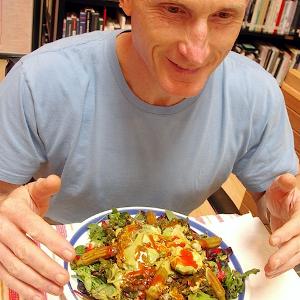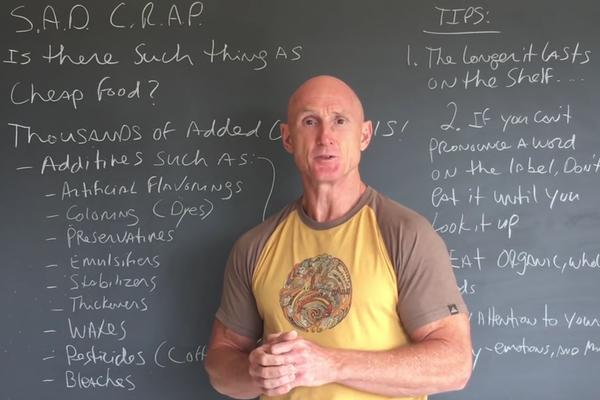Doing Away with the Dogma - What Diet Is Right for You?
by Paul Chek

 I’m often asked about how I make my food choices, especially since it seems like I change the way I eat every now and then.
I’m often asked about how I make my food choices, especially since it seems like I change the way I eat every now and then.
I’ve been a vegetarian twice in my life, followed a macrobiotic diet, and eaten as a protein type in the Metabolic Typing system.
And whenever I talk about a different approach, people get very curious – how could I, Paul Chek, be changing my diet in what looks like radical ways?
I’m going to answer that question here, but not just to clarify why I eat the way I do. I want to make a larger point – a point about how I think anyone should make choices about what they eat.
Let’s start with my dietary story for some context.
Why I Became a Vegetarian and What Happened When I Did

I was a vegetarian first as a 13-year-old. My mother was a committed yogi for a good 23 years and I was raised with that mindset – a mindset that included a suggested practice of vegetarianism.
Two important teachers for my mother – Paramahansa Yogananda and Rudolph Steiner – suggested vegetarianism as optimal diets, but they both qualified their statements by saying, only when it came naturally and was a healthy thing to do.
I was a vegetarian for six months when I was 13. I became anemic and our Naturopathic Physician told my mother I needed to eat meat. Within one steak I was feeling much better.
I became a vegetarian for the second time a few years ago when my soul guided me to remove all fish, meat, and eggs from my diet. I was guided to eat that way for exactly one year to the day.
This process helped me:
1. Deeply clean myself
2. Develop greater intuitive clarity
3. Evolve in my practices as a shaman
4. Practice what I preach, let go of any dogma, and trust that my soul only knows Love and Truth.
5. Study the effects of a vegetarian diet on my body and mind, and how that diet affected workouts like heavy weight training and rock lifting. I learned so much about myself:
I had to eat a significantly increased amount of beans and legumes. My body also wanted a lot of nuts that previously gave me intolerance reactions. I noticed that when I was a vegetarian, I could eat many things that I couldn’t eat while also eating meat.
I found it MUCH harder to keep muscle mass on. Hard workouts took a noticeably longer time for me to recover from (remember, this is me, and shouldn’t be misread to indicate that all vegetarians will have this response). The harder I trained, the more careful I had to be to get plant foods with high protein and fat content in them or I could watch myself disappearing!
My sex drive diminished significantly, particularly in the last several months of the one-year stint.
6. Cultivate a greater empathy and compassion for others. My feeling nature seemed to be more feminine in general.
The Macrobiotic Diet
I have studied the printed works of Annemarie Colbin, author of Food and Healing, The Book Of Whole Meals and others. I have also studied the works of Michio Kushi, on of the pioneers of macrobiotic dieting in the US. Both of them have excellent information to offer that I’ve included as part of my basic HLC training after exploring them in my own life. This way of eating would be more akin to what Bill Wolcott refers to as a carb type.
After I was most recently a vegetarian, my soul guided me to add eggs and fish to my diet. At this time, I followed the macrobiotic approach as a general theme for six months. Then my soul directed me back to eating meats that worked well for me on an as needed basis.
I found that my recovery from exercise, and my general capacity to handle stress improved. By now, my body really needed the extra nutrients available on a macrobiotic approach that were hard to get with a strict vegetarian approach. Again, this is my individual experience and not a suggestion that everyone will respond this way. That said, my observations about myself fit the pattern I see in my patients.
Metabolic Typing
 I studied Bill Wolcott’s version of metabolic typing (MT) for several years on my own and in my clinical practice. I also studied many other MT pioneers’ work to explore the differences, and there are a number of them.
I studied Bill Wolcott’s version of metabolic typing (MT) for several years on my own and in my clinical practice. I also studied many other MT pioneers’ work to explore the differences, and there are a number of them.
In the Wolcott system, I tested out to be a strong protein type, with sympathetic dominance. I ate that way for a long time, but found that I started to have symptoms of excessive protein in my diet, such as aching in my joints, decreased digestive ability, slowing of bowel transit and retention times, craving sweets, etc.
I had to move to eating more as a mixed type to balance.
Then I found that even that was too much flesh food on some days, and I began eating as a carb type. My body seemed to want/need something from each of the MT diet types at different times of the day, week, or month depending on internal and external environmental factors.
So where does that leave me?
No Rules and Inner Guidance or “Flex-a-tarian” Dieting
In synthesis, my whole approach boils down to meeting your individual needs.
This requires that you have access to your instincts, intellect, imagination, and intuition. If you don’t, you’re more likely to follow diet dogmas and end up needing the help of a Chek HLC Practitioner – someone with adequate experience and an open-minded approach to help you balance and heal.
What is Flex-a-tarian Dieting?
1. Genetic Individuality
Each person has genetic individuality. Your genetic needs are greatly influenced by your parents’ genes. Your genetic origins can range from desert dwelling people where there is often little big game to eat and high plant consumption is the norm, to Eskimos who eat 90% of their diet as flesh and fat. Each of us can fall anywhere on that scale.
You may have one parent that does well on very little meat, and another whose roots are Scandinavian where long winters and a frozen ground meant meat was essential for survival and therefore programmed into their genes. And any individual may emulate one parent more strongly in their dietary needs, or express any variation within the range of their ancestry.
2. Stress Factors
Stress of any physical, emotional or mental nature can significantly change an individual’s dietary needs. If your dietary pattern is too fixed, you can eat yourself deeper into a potential illness/disease state. If you are in touch with your instincts and not stuck in a diet dogma, you’ll adapt naturally to dietary changes.
If you take most any vegetarian into a gym, start loading them and increasing the rate of protein destruction, they are very likely to crave meat because meat is a high protein/fat source that supports most people’s genetic needs easily. Weston A. Price showed clearly in his book, Nutrition and Physical Degeneration that there were no “healthy vegetarian tribes to be found in the world”. Whenever he found one that seemed pretty healthy, there were healthier meat eating tribes nearby.
In his excellent book, Metabolic Man: Ten Thousand Years from Eden (The Long Search for a Personal Nutrition From our Forest Origins to the Supermarkets of Today) Charles Heizer Wharton offers an analysis of the efficiency of gatherers vs. hunters for meeting their needs. He shows that hunting for meat is more efficient and therefore, more likely to support life.
3. Individualized Eating
We all have an obligation to ourselves, to each other, and to the planet.
If we aren’t wise enough to teach our younger generations about life, how it works, and what we must do to support Mother Nature so she can continue to support us in our own growth and development, then our problems are sure to escalate.
After 30 years of committed study in the profession of Holistic Health, I’ve come to the conclusion that eating with the conscious intention of feeding your body what legitimate organic plant and/or flesh foods it needs is what it takes to be healthy.
Only healthy people can make healthy decisions as a general rule. Only healthy people are open minded enough to keep themselves healthy and not participate in dogmas that may sound good, but really just suppress our natural instincts and don’t actually create health.
FOR ME, it all boils down to this.
If I am to be part of the healing process, to be sensitive to what is needed by both humanity and by Mother Nature, and feel safe that I can trust my instincts, I must be healthy.
If I am to have enough life-force energy to actively create my dreams and share my wisdom with those that may benefit from it, I can’t afford to save a chicken or a cow if it means that my own health will suffer.
If I continue to be a vegetarian when my body tells me to do otherwise, how long will it be before I don’t have the energy to even ring the bell of animal abuse, recycling, water consciousness, or food awareness? While I’m saving a few chickens and cows, I risk diminished health and vitality, and therefore available energy to be the change.
I love all life in nature. I love all animals.
I also love myself enough to know that nature designed each and all to participate in a natural balancing act called “Life”.
Eat to Balance Your Body-Mind
So there it is.
I have no diet dogma.
[dt_quote type=”blockquote” font_size=”normal” animation=”none” background=”plain”]My foundational principle is to learn to feel what your body needs and feed it wisely.[/dt_quote]
This is exactly what I teach in my book How To Eat, Move and Be Healthy! my ebook The Last 4 Doctors You’ll Ever Need, as well as my Primal Pattern Eating audio program.
[dt_quote type=”blockquote” font_size=”normal” animation=”none” background=”plain”]Eating as a vegan, vegetarian, meat eater, or “flex-a-tarian” are all legitimate approaches to balancing the human body-mind. No one approach should be worshiped. No one approach should be seen as better or worse than the other unless it is evaluated against your overall level of well-being, or lack thereof.[/dt_quote]
If we are to leave the world a little better for our children than it was when we got here, it is high time that we all stop reading magazines, books on diet dogma, and listening to people selling snake oil, get-slim-quick pills on TV and start cultivating a loving, open-minded relationship with ourselves.
With that objective managed, we will naturally find that our relationships and our contributions to the world reflect our level of sound health in sound actions for the betterment of all.
I hope this helps you to navigate your way to a healthy diet for you. I welcome your questions, comments and experiences, so please share them in the comments section below.
Love and chi,
Paul Chek


